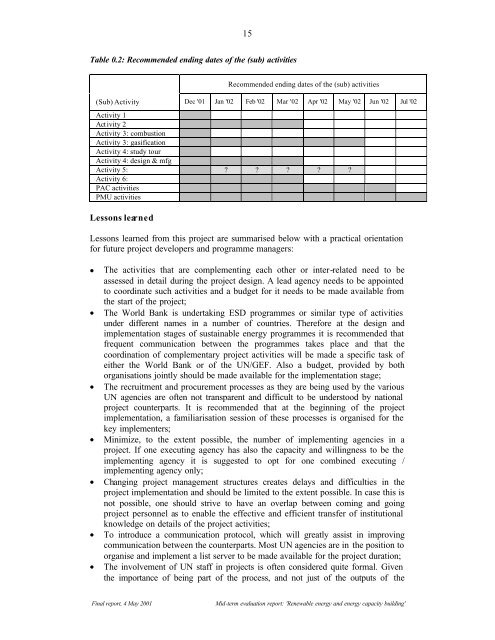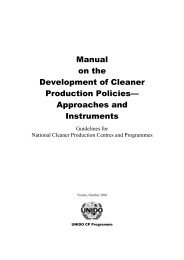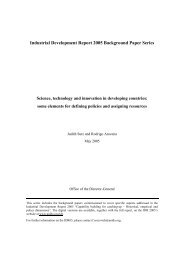Mid-term Evaluation Report Sri Lanka - Unido
Mid-term Evaluation Report Sri Lanka - Unido
Mid-term Evaluation Report Sri Lanka - Unido
You also want an ePaper? Increase the reach of your titles
YUMPU automatically turns print PDFs into web optimized ePapers that Google loves.
15<br />
Table 0.2: Recommended ending dates of the (sub) activities<br />
Recommended ending dates of the (sub) activities<br />
(Sub) Activity Dec '01 Jan '02 Feb '02 Mar '02 Apr '02 May '02 Jun '02 Jul '02<br />
Activity 1<br />
Act ivity 2<br />
Activity 3: combustion<br />
Activity 3: gasification<br />
Activity 4: study tour<br />
Activity 4: design & mfg<br />
Activity 5: ? ? ? ? ?<br />
Activity 6:<br />
PAC activities<br />
PMU activities<br />
Lessons learned<br />
Lessons learned from this project are summarised below with a practical orientation<br />
for future project developers and programme managers:<br />
• The activities that are complementing each other or inter-related need to be<br />
assessed in detail during the project design. A lead agency needs to be appointed<br />
to coordinate such activities and a budget for it needs to be made available from<br />
the start of the project;<br />
• The World Bank is undertaking ESD programmes or similar type of activities<br />
under different names in a number of countries. Therefore at the design and<br />
implementation stages of sustainable energy programmes it is recommended that<br />
frequent communication between the programmes takes place and that the<br />
coordination of complementary project activities will be made a specific task of<br />
either the World Bank or of the UN/GEF. Also a budget, provided by both<br />
organisations jointly should be made available for the implementation stage;<br />
• The recruitment and procurement processes as they are being used by the various<br />
UN agencies are often not transparent and difficult to be understood by national<br />
project counterparts. It is recommended that at the beginning of the project<br />
implementation, a familiarisation session of these processes is organised for the<br />
key implementers;<br />
• Minimize, to the extent possible, the number of implementing agencies in a<br />
project. If one executing agency has also the capacity and willingness to be the<br />
implementing agency it is suggested to opt for one combined executing /<br />
implementing agency only;<br />
• Changing project management structures creates delays and difficulties in the<br />
project implementation and should be limited to the extent possible. In case this is<br />
not possible, one should strive to have an overlap between coming and going<br />
project personnel as to enable the effective and efficient transfer of institutional<br />
knowledge on details of the project activities;<br />
• To introduce a communication protocol, which will greatly assist in improving<br />
communication between the counterparts. Most UN agencies are in the position to<br />
organise and implement a list server to be made available for the project duration;<br />
• The involvement of UN staff in projects is often considered quite formal. Given<br />
the importance of being part of the process, and not just of the outputs of the<br />
Final report, 4 May 2001<br />
<strong>Mid</strong>-<strong>term</strong> evaluation report: 'Renewable energy and energy capacity building'
















